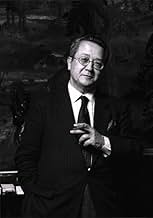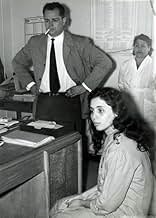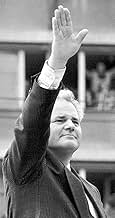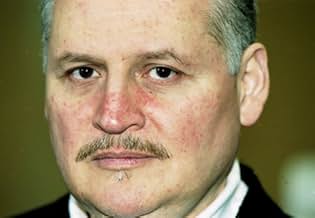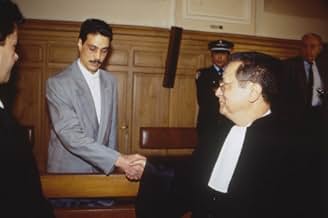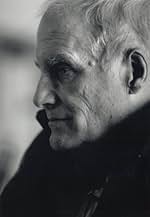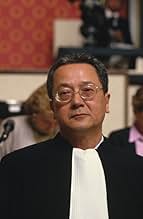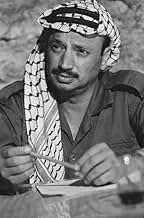IMDb RATING
7.1/10
1.8K
YOUR RATING
A documentary on Jacques Vergès, the controversial lawyer and former Free French Forces guerrilla who has defending unpopular figures such as Nazi war criminal Klaus Barbie and Holocaust den... Read allA documentary on Jacques Vergès, the controversial lawyer and former Free French Forces guerrilla who has defending unpopular figures such as Nazi war criminal Klaus Barbie and Holocaust denier Roger Garaudy.A documentary on Jacques Vergès, the controversial lawyer and former Free French Forces guerrilla who has defending unpopular figures such as Nazi war criminal Klaus Barbie and Holocaust denier Roger Garaudy.
- Awards
- 2 wins & 5 nominations total
Klaus Barbie
- Self
- (archive footage)
Barbet Schroeder
- Récitant
- (voice)
- …
Zohra Drif-Bitat
- Self
- (as Zohra Drif)
Guillaume Durand
- Self
- (archive footage)
Featured reviews
Jacques Vergès has been the defense attorney for members of the Khmer Rouge, Algerian FLN, Palestinian PFLP, and other terrorists. It starts with him as a French foot soldier. As a young lawyer, he's contacted by the Algierian resistance and he became their sympathetic disruptive famous lawyer. Using footage from "The Battle of Algiers", it tries to explain the struggle. It's mostly his friends, clients and supporters in this movie.
The movie starts with him defending Khmer Rouge leaders and that's really annoying. This is very much an one-sided monologue. It's somewhat interesting to follow his life and career but he's a fanatic. He's not some ACLU lawyer looking to ensure rights of the condemned. This guy has no objectivity or sympathy other than for his clients. It feels like the movie is preaching to the choir. There is also an arrogance to the man that is off-putting. I don't know why he won't reveal where he was for those years. He's there smoking his cigar and I'm sure the documentarians must have asked. It's part of his superiority complex. It's not until the Nazi connections that the movie gets interesting but that takes over an hour to get there. However the movie fails to connect all the dots. This documentary fails to answer some very basic questions about who this guy is and where he comes from. The investigation is incomplete.
Then there is the style of the documentary. It is non-stop talking heads make it rather boring. It's like trying to cobble together a narrative with each witness giving one or two sentences. Most docs use a narrator to direct and drive the discussion. This one needs something more than talking heads talking. This feels like a rambling run-on sentence.
The movie starts with him defending Khmer Rouge leaders and that's really annoying. This is very much an one-sided monologue. It's somewhat interesting to follow his life and career but he's a fanatic. He's not some ACLU lawyer looking to ensure rights of the condemned. This guy has no objectivity or sympathy other than for his clients. It feels like the movie is preaching to the choir. There is also an arrogance to the man that is off-putting. I don't know why he won't reveal where he was for those years. He's there smoking his cigar and I'm sure the documentarians must have asked. It's part of his superiority complex. It's not until the Nazi connections that the movie gets interesting but that takes over an hour to get there. However the movie fails to connect all the dots. This documentary fails to answer some very basic questions about who this guy is and where he comes from. The investigation is incomplete.
Then there is the style of the documentary. It is non-stop talking heads make it rather boring. It's like trying to cobble together a narrative with each witness giving one or two sentences. Most docs use a narrator to direct and drive the discussion. This one needs something more than talking heads talking. This feels like a rambling run-on sentence.
A reminder that those that start out with the best intentions can become just as demented as the forces they are battling against. If not much worse. I suspect the reason the director made a straight documentary instead of a biographic film is that fact no one would believe such a character could possibly exist in real life.
Jacques Verges is the link that connects the most heinous figures of the twentieth century, but if you were just to go by his account you might almost be convinced he was a swell guy. The mental gymnastics this man performs to avoid admitting a single regret in his life is breathtaking (killing civilians kind of a gray area with Verges).
I suppose if you can convince yourself becoming Pol Pot's counsel and trusted confidante is worth abandoning your family for seven years, you are capable of justifying literally anything.
Jacques Verges is the link that connects the most heinous figures of the twentieth century, but if you were just to go by his account you might almost be convinced he was a swell guy. The mental gymnastics this man performs to avoid admitting a single regret in his life is breathtaking (killing civilians kind of a gray area with Verges).
I suppose if you can convince yourself becoming Pol Pot's counsel and trusted confidante is worth abandoning your family for seven years, you are capable of justifying literally anything.
This movie gives an astonishingly revealing picture of the outspoken French lawyer Jacques Vergès, who defended such controversial figures as the terrorist Carlos, the Nazi criminal Klaus Barbie or a member of the Algerian resistance against French rule, Djamila Bouhireb. Jacques Vergès even confirms that he would have defended Adolf Hitler IF he pleaded guilty (George Steiner did it in his formidable book 'In Bluebeard's Castle').
The movie reveals also the existence of a right-wing - religious financial network which provides judicial help for former fascists, like Nazi criminals. However, Barbet Schroeder could not uncover the exact nature of Jacques Vergès's pro-Palestinian actions or his support of the Red Khmer regime (on which he gives here, again controversially, a more or less positive comment) during the years of his life when he acted 'behind the scenes'.
This movie is a fascinating portrait of an iconoclastic rebel with a formidable intelligence and a profound analyzing capacity of the dark regions of man's nature and the amoral or immoral motives behind his behavior. By incorporating this behavior in a global context of 'a world at war, a resistance to a colonial rule or a defense of minorities', he could (can) denounce all the parties involved or attack frontally the existing global world order and its alleged morality. A must see.
The movie reveals also the existence of a right-wing - religious financial network which provides judicial help for former fascists, like Nazi criminals. However, Barbet Schroeder could not uncover the exact nature of Jacques Vergès's pro-Palestinian actions or his support of the Red Khmer regime (on which he gives here, again controversially, a more or less positive comment) during the years of his life when he acted 'behind the scenes'.
This movie is a fascinating portrait of an iconoclastic rebel with a formidable intelligence and a profound analyzing capacity of the dark regions of man's nature and the amoral or immoral motives behind his behavior. By incorporating this behavior in a global context of 'a world at war, a resistance to a colonial rule or a defense of minorities', he could (can) denounce all the parties involved or attack frontally the existing global world order and its alleged morality. A must see.
After having seen Schroeder's Idi Amin and Kiki the talking gorilla, I was disappointed by L'avocat. From an artistic point of view it is not on the same level. I found it difficult to recognize the organizing, guiding hand of the director. Also, the subject is strangely out of focus but that is maybe just one of the points the movie wants to make. Maître Vergès must be a pretty elusive fellow and certainly not someone who let himself manipulate by a movie maker. And - contrary to Amin and the gorilla - Vergès is just not very telegenic. That's certainly nobody's fault, it's just a fact.
What remains for me are the many bonmots" this movie contains. It did not become clear to me if Vergès ever was a good lawyer. I suspect he always saw the court of law principally as a stage for making political statements or for furthering a certain self image. But he certainly is a great story teller. My only war wound", he tells the interviewer, was self inflicted I cut a finger when I closed my pocket knife after eating a dish of oysters". Mao listened to me attentively or maybe he just wanted to be polite." It is fun to listen to him telling these anecdotes and being disrespectful, even to himself. Many, maybe too many other people make their entrance as interviewees. Even for someone who has a notion of the last few decades of world history it is not always easy to follow.
Saying all this, I have to credit the movie for forming a pattern of statements, places and time periods that recount events which brought a lot of pain and sorrow to this planet. The central question - is Maître Vergès a man with a cause? - remains unanswered. Somehow he shifted from one liberation movement" to the next, maybe connected to secret services, maybe not - his aims apparently as fuzzy as those of the said movements - never drowning like others but always ending up seemingly comfortably on the surface. It is never clear how much Vergès was a prime mover on the terrorist scene or a teleguided pawn. After seeing this movie I would liken him to a joker in a pack of cards.
Someone not very deep into history might be surprised at how L'avocat shows that there were always connections and sympathies between old, active Nazis and young, seemingly leftist revolutionaries. Others know the old French saying: Les extrèmes se touchent.
What remains for me are the many bonmots" this movie contains. It did not become clear to me if Vergès ever was a good lawyer. I suspect he always saw the court of law principally as a stage for making political statements or for furthering a certain self image. But he certainly is a great story teller. My only war wound", he tells the interviewer, was self inflicted I cut a finger when I closed my pocket knife after eating a dish of oysters". Mao listened to me attentively or maybe he just wanted to be polite." It is fun to listen to him telling these anecdotes and being disrespectful, even to himself. Many, maybe too many other people make their entrance as interviewees. Even for someone who has a notion of the last few decades of world history it is not always easy to follow.
Saying all this, I have to credit the movie for forming a pattern of statements, places and time periods that recount events which brought a lot of pain and sorrow to this planet. The central question - is Maître Vergès a man with a cause? - remains unanswered. Somehow he shifted from one liberation movement" to the next, maybe connected to secret services, maybe not - his aims apparently as fuzzy as those of the said movements - never drowning like others but always ending up seemingly comfortably on the surface. It is never clear how much Vergès was a prime mover on the terrorist scene or a teleguided pawn. After seeing this movie I would liken him to a joker in a pack of cards.
Someone not very deep into history might be surprised at how L'avocat shows that there were always connections and sympathies between old, active Nazis and young, seemingly leftist revolutionaries. Others know the old French saying: Les extrèmes se touchent.
the film begins with a credit, as stated in other reviews, that it represents the point of view of the director. the material is ambiguous but it seems to me pretty clear that Schroder respects Verges. I disagree strongly with the person who imagines it'd be more "interesting" to watch a doc about lawyers who represent people they despise and wonder what at all would be interesting about that. yes the film leaves some questions unanswered and in the interest of covering more ground on its subject does not get bogged down with some details about the role in history of some of the figures involved. this hardly means that the film was formless, incoherent, but as another reviewer mentioned the film requires the viewer to think, does not hand over conclusions wrapped up in a nice package with a bloody bow on top. It seems indisputable that Verges was a *collaborator* with those of his clients involved in "the struggle" against colonialism, whom he viewed as nothing more or less than soldiers, some honorable and some not so much. He took on the indefensible case of barbie to hold up a mirror to France's record in algeria. I don't really understand peoples' confusion about schroder's point of view of this complicated but far from unfathomable character. I appreciate that this film points the way to other viewing cf the battle of algiers.
Did you know
- Quotes
Jacques Vergès: I was asked "Would you defend Hitler?" I said "I'd even defend Bush! But only if he agrees to plead guilty."
- ConnectionsFeatured in Siskel & Ebert & the Movies: The Best of 2007 (2007)
- How long is Terror's Advocate?Powered by Alexa
Details
- Release date
- Country of origin
- Official sites
- Languages
- Also known as
- Terror's Advocate
- Filming locations
- Production companies
- See more company credits at IMDbPro
Box office
- Gross US & Canada
- $47,724
- Opening weekend US & Canada
- $11,197
- Oct 14, 2007
- Gross worldwide
- $1,086,656
- Runtime2 hours 15 minutes
- Color
- Sound mix
- Aspect ratio
- 1.85 : 1
Contribute to this page
Suggest an edit or add missing content







